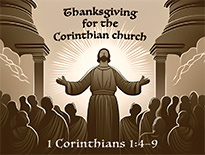First Corinthians 1:1–17 . . . Bible Study Summary with Questions
Introduction / Questions and Answers
First Corinthians was written by Apostle Paul while in Ephesus during his third missionary journey. What’s particularly amazing is that Paul managed to write such a comprehensive, influential letter while working as a tentmaker with Aquila and Priscilla. Despite his busy schedule, Paul addressed numerous issues including division, sexual immorality, marriage and divorce, food offered to idols, lawsuits among believers, the resurrection, and questions about spiritual gifts, demonstrating his deep commitment to guiding the early Christian community.
• When was it written? Around AD 55, approximately 20 to 25 years after Jesus’ death and resurrection.
• Why was it written? Word had reached the apostle Paul that the Christian community in Corinth had fallen into a variety of serious moral errors. The vibrantly pagan culture that Corinth was famous for had crept into the church there — to the point where there was alarmingly little that distinguished Christians from non-Christians.
But Paul’s letter to the spiritually struggling Corinthian church body wasn’t intended just to harangue them for their failings. He challenged his Corinthian brothers and sisters not to step back from error but to actively cultivate holy lives in emulation of Jesus Christ.
• What does it say? In his characteristic style, Paul opens his first letter by getting straight to the heart of the Corinthians’ problem: misplaced priorities. He contrasts the wisdom of the world with the wisdom of God (as we’ll cover in next week’s summary of 1 Cor. 1:18–31) by asking the Corinthians — proud of their philosophical knowledge — which type of wisdom they ought to pursue.
From there, Paul moves on to address the specific moral problems in the Corinthian church, including divisiveness (1 Cor. 4), sexual immorality (1 Cor. 5, 6:12–20), and litigiousness (1 Cor. 6:1–18). His words, however harsh, are always accompanied by positive encouragement to strive for holiness. Throughout the letter his genuine concern is evident: “I am writing this not to shame you but to warn you as my dear children” (1 Cor. 4:14).
Paul’s letter wraps up with some of the most well-known passages in the entire Bible, notably the famous “Love chapter” and an eloquent explanation of the great hope around which Christianity revolves: the resurrection of Christ Jesus.
Sneak preview To find more easy-to-understand summaries of Paul’s teachings that he graciously made available to Corinthian believers, click the appropriate menu tabs atop this and every one of Warren’s commentary pages. Hopefully, you’ll enjoy being taught by Paul.
Note: 1st Corinthians challenges believers to examine every aspect of their lives through the lens of the Gospel. In chapters 1–4, Paul presents these four challenges:
Christ is God’s wisdom (ch. 1) | Spiritual wisdom (ch. 2)
The church and its leaders (ch. 3) | True apostleship (ch. 4)
› Watch BibleProject’s superb animated video (1 min.) that highlights Paul’s messages in these first four chapters.
† Summary of 1 Corinthians 1:1–17
• Introduction and Greeting (vv. 1–3)
Paul begins the letter (shown at the bottom of this page) by introducing himself as an apostle of Jesus Christ by God’s will. He addresses the church body in Corinth, describing its members as sanctified in Christ Jesus and called to be holy with all believers everywhere who call on Jesus’ name. To them, Paul extends grace and peace from God the Father and the Lord Jesus Christ.
• Thanksgiving for the Corinthians (vv. 4–9)
Paul expresses gratitude to God for the grace given to the Corinthians through Jesus, highlighting that they’re richly blessed with spiritual gifts and knowledge, all of which confirm their true belonging in Christ. He acknowledges their spiritual enrichment in speech and knowledge, which confirms the testimony of Christ among them. Next, he assures them that they lack no spiritual gift as they await Christ’s return and then reminds them that Father God is faithful, having called them into fellowship with his Son. Paul closes this passage by emphasizing that God’s faithfulness will sustain them until the end, ensuring that they’ll stand blameless on the day of the Lord Jesus Christ’s second coming.
• Appeal for Unity (vv. 10–17)
In the six verses Paul urges the Corinthians to avoid divisions and be united in mind and thought. He addresses reports from Chloe’s household about quarrels among them, with members claiming allegiance to different leaders (Paul, Apollos, Cephas, and Christ). Paul rebukes this factionalism, reminding them that Christ isn›t to be divided and that they were baptized in his name, not in the name of any human leader. Closing, he emphasizes his mission to preach the gospel, not with eloquent wisdom, but with a focus on Christ’s cross so that its power wouldn’t be diminished.
† Key Themes of this Passage
1) Unity in Christ: Paul stresses the importance of unity in the church, warning against divisions based on loyalty to human leaders.
2) Spiritual Gifts: The Corinthians are reminded of their spiritual blessings and encouraged to use them while awaiting Christ’s return.
3) Centrality of the Cross: Paul highlights that his mission is to preach the gospel centered on Christ’s crucifixion rather than relying on human wisdom or rhetoric.
Note: This letter’s opening passage sets the tone for addressing issues in the Corinthian church. It focuses on their identity in Christ and their call to unity and holiness. The main theme of 1 Corinthians 1:1-17 is unity in Christ and the rejection of divisions within the church. Paul addresses the problem of factionalism among the Corinthians, who were aligning themselves with different leaders (e.g., Paul, Apollos, Cephas). He emphasizes that Christ isn’t divided and that their allegiance should be to him alone, not to human leaders. This call for unity is grounded in the message of the cross, which Paul highlights as central to the gospel — not dependent on human wisdom or eloquence.
- Q. 1 After reading vv. 4–9 (below), what impression do you get of the Corinthians? What do those in your Bible-study group and the people in your community have in common with the Corinthians? Do you personally have something in common with the Corinthians?
- Q. 2 What divides the church in Corinth (vv. 11–12, 15)? Who was Apollos (See Acts 18:24–28)?
† Watch this introductory video clip created by BibleProject on bibleproject.com.
1 Corinthians 1:1-17
New International Version (NIV)
[You can view it in a different version by clicking here; you can also listen to this chapter.]
1Paul, called to be an apostle of Christ Jesus by the will of God, and our brother Sosthenes,
2To the church of God in Corinth, to those sanctified in Christ Jesus and called to be his holy people, together with all those everywhere who call on the name of our Lord Jesus Christ — their Lord and ours:
3Grace and peace to you from God our Father and the Lord Jesus Christ.
Thanksgiving
4I always thank my God for you because of his grace given you in Christ Jesus. 5For in him you have been enriched in every way — with all kinds of speech and with all knowledge — 6God thus confirming our testimony about Christ among you. 7Therefore you do not lack any spiritual gift as you eagerly wait for our Lord Jesus Christ to be revealed. 8He will also keep you firm to the end, so that you will be blameless on the day of our Lord Jesus Christ. 9God is faithful, who has called you into fellowship with his Son, Jesus Christ our Lord.
A Church Divided Over Leaders
10I appeal to you, brothers and sisters, in the name of our Lord Jesus Christ, that all of you agree with one another in what you say and that there be no divisions among you, but that you be perfectly united in mind and thought. 11My brothers and sisters, some from Chloe’s household have informed me that there are quarrels among you. 12What I mean is this: One of you says, “I follow Paul”; another, “I follow Apollos”; another, “I follow Cephas”; still another, “I follow Christ.”
13Is Christ divided? Was Paul crucified for you? Were you baptized in the name of Paul? 14I thank God that I did not baptize any of you except Crispus and Gaius, 15so no one can say that you were baptized in my name. 16(Yes, I also baptized the household of Stephanas; beyond that, I don’t remember if I baptized anyone else.) 17For Christ did not send me to baptize, but to preach the gospel — not with wisdom and eloquence, lest the cross of Christ be emptied of its power.

